7-Day Meal Plan For Muscle Gain – The Basics Of The Bodybuilder’s Diet
Whether recreational or competitive, bodybuilding is a lifestyle, as it involves both the time you spend in and out of the gym. The reason for this is simple – when you’re attempting to build muscle mass, what you eat is just as important as working out in the gym.

Using a 7-day meal plan for muscle gain can become frustrating if you don’t understand the science behind building muscles. In addition to the basics of bodybuilding, calorie, and macro needs, this article explains what to eat and what to avoid on a bodybuilding diet and provides a one-week sample menu.
How Does Your Body Build Muscle?
The process of muscle gain and fat loss happens primarily as a result of an energy imbalance i.e. the calorie equation.
Running on a treadmill for an hour each day won’t necessarily make you gain muscle mass. Neither will lifting weights alone. The real secret behind building muscle mass is a calorie surplus. A well-balanced diet combined with an efficient exercise regimen is essential to gaining lean muscle mass (4).
High-intensity training and hard weight lifting can provide dramatic results in muscle gain; however, without the right diet, it will not result in the body you want. In fact, without a balanced diet and sufficient calories, your hard workouts will be wasted on gaining no muscle at all.
Read More: An Effective 7-Day Workout Plan To Build Muscle
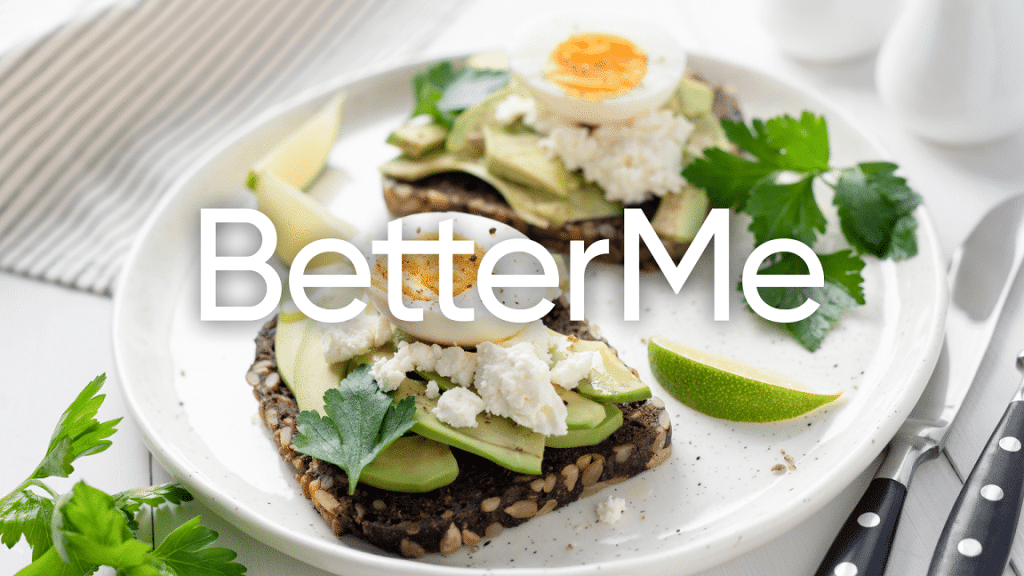
How Many Calories Do You Need To Build Muscle?
A 7-day meal plan for weight loss and muscle gain consists of two phases, the bulking and cutting phase:
Bulking Phase
This phase allows for muscle gain and fat loss simultaneously. It lasts anywhere from a few months to years, depending on a number of factors such as experience level, time to reach desired goal, body weight, age, etc (7).
During your bulking phase, it’s recommended to increase your calorie intake by 15% (6). For example, if your maintenance calories are 2,500 per day, you should eat 2,875 calories per day (2,000 x 0.15 = 375) during your bulking phase.
Cutting Phase
After the bulking cycle has been completed, it becomes necessary to burn off the excess fat. The cutting phase is much shorter than the bulking phase, lasting anywhere from a few weeks to 6 months. During your cutting phase, it’s recommended to decrease your calorie intake by 15% (6). For example, if your maintenance calories are 2,500 per day, you should eat 2,125 calories per day (2,000 x 0.15 = 375) during your cutting phase.
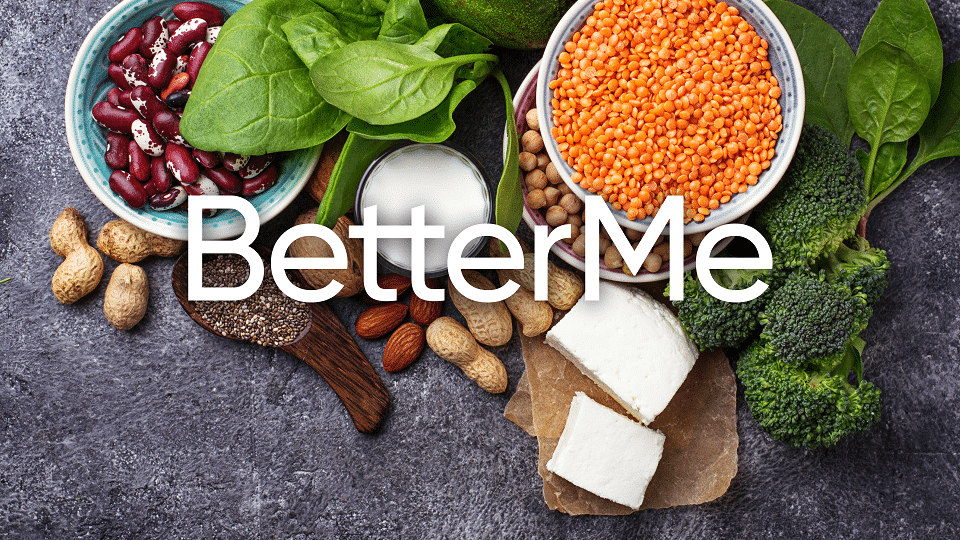
What’s The Ideal Macro Ratio For Gaining Muscle?
Although your calorie intake will vary at different phases of the muscle building cycle, your macro ratio is likely to stay constant. To gain muscle, it’s recommended that you get (5):
-
30–35% of your calories from protein
-
55–60% of your calories from carbs
-
15–20% of your calories from fat
If you’ve mustered up the courage to crush your weight loss goal, let Betterme take the sting out of this demanding process. Our app will help you restructure your habits, remold your life and crank up your fitness results!
What To Eat On The Bodybuilding Diet
Eating the right foods in the recommended amounts supplies your muscles with sufficient nutrients to recover from intense workouts and grow bigger. Some of the foods that should feature on your 7-day meal plan for lean muscle gain include:
Carbohydrates
Carbs are the main source of energy for your body. They are essential for powering you through high intensity workouts and keeping you going throughout the day.
Consume starchy carbohydrates such as rice, pasta and bread to provide you with an adequate amount of energy to train at a high intensity. Also go for starchy vegetables such as potatoes, corn, and cassava.

Protein
This is the main nutrient that supports long term muscle growth. It’s also satiating enough to power you through the day without having to snack on unhealthy foods. Eat lean proteins like lean beef, skinless chicken, fish and turkey every day to ensure your recovery from tough workouts.
Vegetables
All vegetables are rich in nutrients and fibre that support digestion, metabolism and muscle growth. Green leafy vegetables such as spinach, kale, watercress and broccoli contain high amounts of iron, vitamin A and folate which help you recover from intense training. Vegetables also contain antioxidants that prevent muscle damage and aid muscle recovery (2).


Get your
personal plan
according to your age and BMI
Select your gender
Male
Female

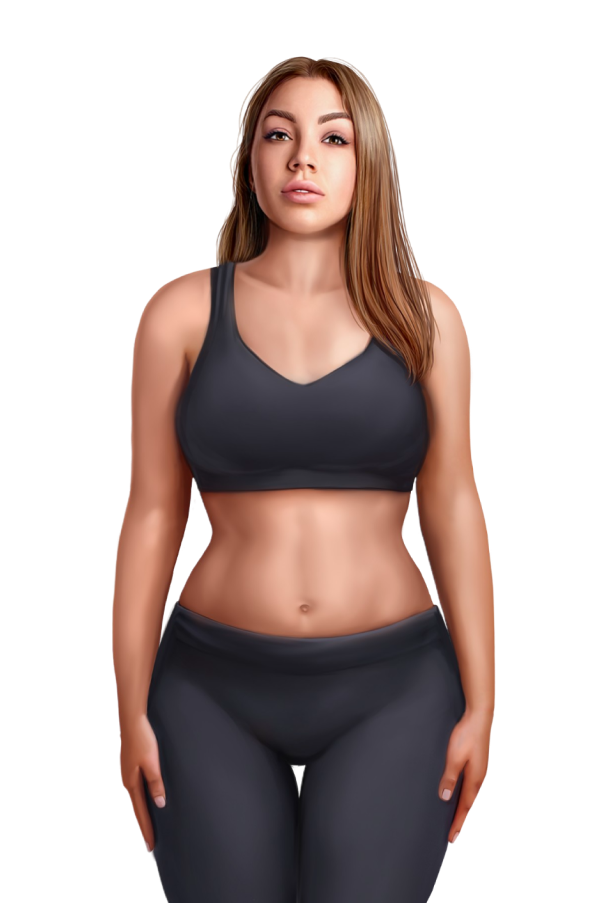
Get your
personal plan
according to your age and BMI
Select your gender
Male
Female
Fibre
One of the most important nutrients for good digestion and to fuel efficient workouts is fibre. Fibre slows down digestion, providing your body with longer lasting energy, repairs damaged cells and can keep you feeling fuller for longer so you don’t feel like snacking when not on a training session (3). High fibre foods include brown rice, whole wheat bread, oats and beans and legumes.
Healthy Fats
Healthy fats are essential for a balanced diet. They supply your body with energy, keep you full for longer and aid muscle recovery (1). Healthy fats include avocado, extra virgin olive oil, fatty fish, nuts such as almonds and walnuts and seeds such as sunflower seeds.
Read More: Resistance Band Butt Workout: 13 Effective Moves To Build Muscle

Muscle-Building Supplements
Taking supplements is crucial if you’re following a training regiment to help maximise your muscle building efforts. Supplements contain vitamins, minerals and amino acids that keep you healthy when training hard and increase the rate at which you gain muscle mass. Some of the most popular bodybuilding supplements include:
-
Whey protein – an easy and convenient way to increase your protein intake
-
Creatine – provides your muscles with the energy needed to perform an additional rep or two.
-
Caffeine – decreases fatigue and allows you to work harder.
You can take a pre-workout supplement before every workout such as whey protein mixed with creatine and essential amino acids to fuel effective workouts; during your workout take a BCAA supplement to prevent muscle damage; and take a protein shake with essential amino acids, creatine and glutamine after every workout (10).
Make sure to use the right amount of supplements recommended by your trainer in order to achieve effective results without any adverse side effects. Always discuss any supplements with your healthcare provider, especially if you have any medical conditions or are on any medications.
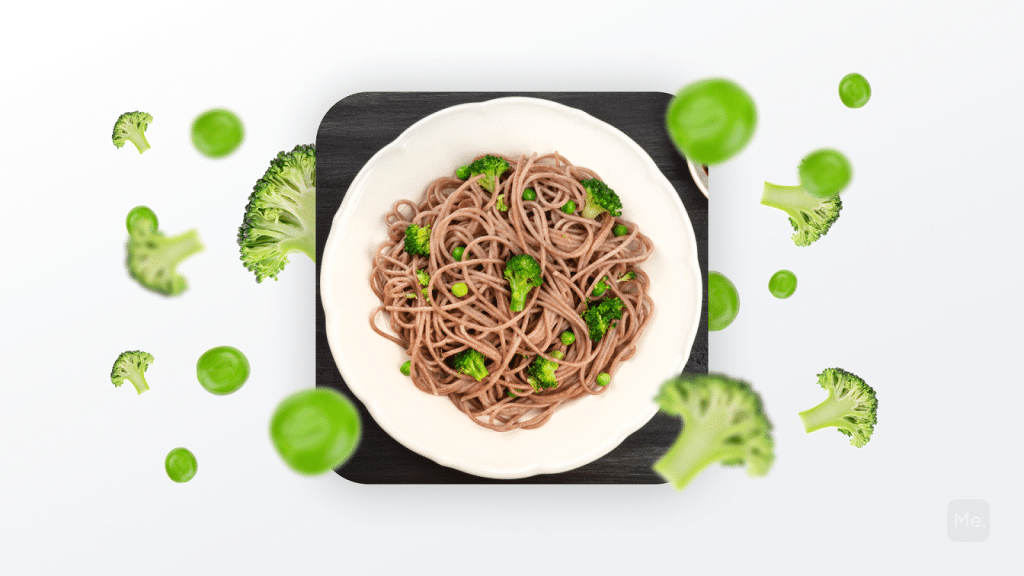
What To Avoid On The Bodybuilding Diet
Consuming the wrong foods, or not having enough of the right ones can frustrate your bodybuilding efforts. Here are some foods you should limit or avoid altogether:
Alcohol
Consuming alcohol can increase the rate at which you gain fat which will make it harder for you to build muscle mass. While pure alcohol can help temporarily improve your mood and give you more energy, it’s not a good idea to drink alcohol while trying to put on lean mass (9).
Reasons why BetterMe is a safe bet: a wide range of calorie-blasting workouts, finger-licking recipes, 24/7 support, challenges that’ll keep you on your best game, and that just scratches the surface! Start using our app and watch the magic happen.
Deep Fried Foods
Fried foods are full of unhealthy fats which can have adverse effects on your body. Fried foods don’t provide your body with the nutrients it needs to build muscle and the excess amount of fat in them will make it harder for you to lose weight.
Added Sugars
Avoid adding sugar into your food as much as possible. Foods containing added sugars are high in calories and often high in fat which makes it impossible for you to gain lean mass.
Consume foods that are rich in protein such as skinless chicken, fish and turkey to help prevent muscle breakdown while following the bodybuilding diet.
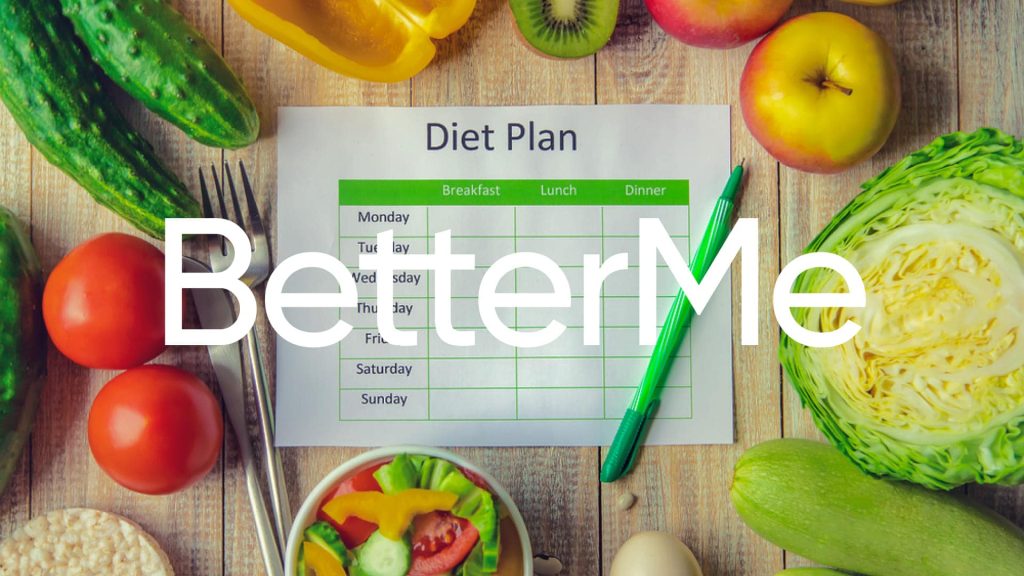
Sample 7-Day Meal Plan For Muscle Gain
Here’s a sample one-week bodybuilding menu. Each day has approximately 2500 calories worth of nutritious foods. When you’re bulking, you’ll increase how much food you eat and when you’re cutting you will reduce it. You can enjoy the foods in this menu during either phase, just be sure to adjust your portions accordingly.
Day One
- Breakfast:
2 bowls of corn flakes and 2 servings of whole wheat toast (100.5g carbs,11.2g fat, 27.3g protein and 585 calories)
- Lunch:
2 servings of quick buffalo chicken salad alongside 1 ounce of almonds (23.1g carbs, 31.2g fat, 62.8g protein and 620 calories)
- Snack:
1 cup of grains and 1 serving of yogurt and strawberries (43.1g carbs, 1.5g fat, 25.6g protein and 287 calories)
- Supper:
2 BBQ chicken sandwiches and 1 serving of easy hard-boiled eggs (80.9g carbs, 34.5g fat, 90.1g protein and 1011 calories)
Total daily calories: 2503
Day Two
- Breakfast:
4 banana egg pancakes and 1 apple (80.3g carbs, 20.1g fat, 28.2g protein and 591 calories)
- Lunch:
2 servings of turkey lettuce rollups and 2 cups of basic protein shake (34.7g carbs, 14.2g fat, 82.2g protein and 603 calories)
- Snack:
1 apple alongside almond butter (31.1g carbs, 18.1g fat, 7.2g protein and 291 calories)
- Supper:
2 BBQ chicken sandwiches (80.5g carbs, 29.9g fat, 83.6g protein and 940 calories)
Total daily calories: 2425
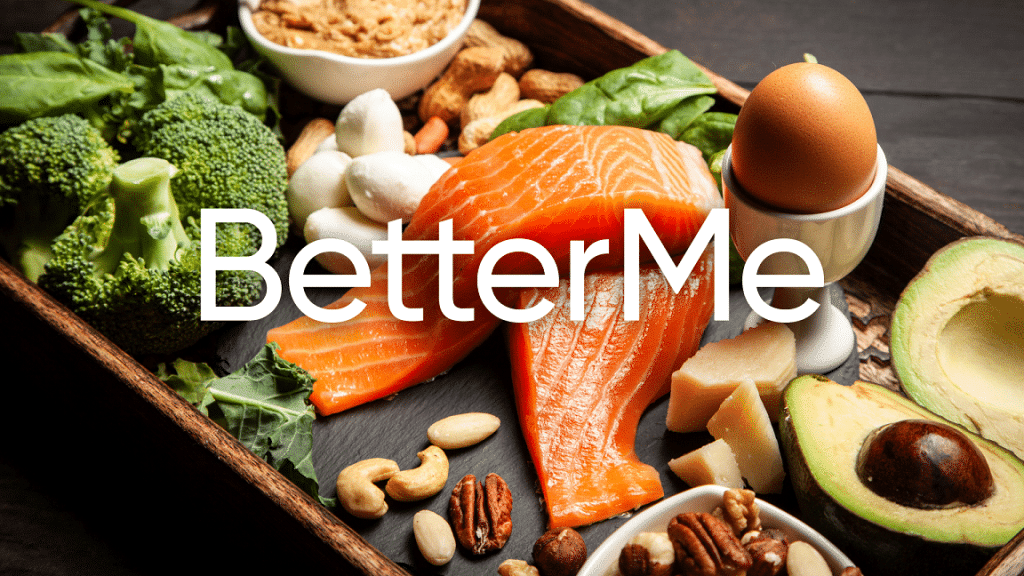
Day Three
- Breakfast:
2 egg and cheese breakfast sandwiches (75.1g carbs, 18.3g fat, 38.9g protein and 617 calories)
- Lunch:
2 peach protein smoothies (93.6g carbs, 7.4g fat, 67.3g protein and 689.8 calories)
- Snack:
1 apple alongside almond butter and 1 serving of cucumber slices (34.9g carbs, 18.1g fat, 7.9g protein and 307 calories)
- Supper:
2 servings of mongolian beef (93g carbs, 39.7g fat, 54.6g protein and 940 calories)
Total daily calories: 2544
Day Four
- Breakfast:
2 servings of blueberry protein pudding and 2 slices of buttered toast (50.1g carbs, 14.1g fat, 79.99g protein and 675 calories)
- Lunch:
2 simple caprese sandwiches (104g carbs, 17.5g fat, 33.9g protein and 706.7 calories)
- Snack:
1 bowl of cornflakes and 1 apple (60.1g carbs, 5g fat, 10.6g protein and 317 calories)
- Supper:
2 servings of fried eggs and ham sandwich (55.8g carbs, 36.6g fat, 62.3g protein and 940 calories)
Total daily calories: 2515
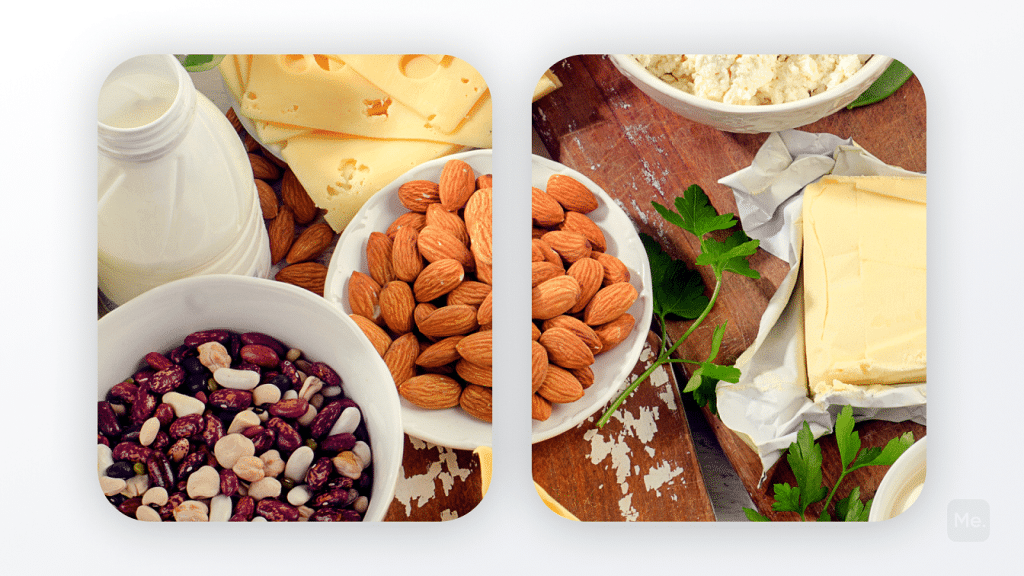
Day Five
- Breakfast:
2 servings of cottage cheese breakfast (31.9g carbs, 40.3g fat, 71.3g protein and 752 calories)
- Lunch:
2 cups of basic protein shakes and 1 cup of grapes (56.7g carbs, 11.8g fat, 65.2g protein and 588 calories)
- Snack:
1 bowl of cornflakes and 1serving of cheese slices (35.7g carbs, 14.6g fat, 16.9g protein and 337 calories)
- Supper:
2 servings of easy grilled chicken teriyaki and 2 servings of easy steamed green beans (44.2g carbs, 17.3 fat, 118.6g protein and 807 calories)
Total daily calories: 2485
Day Six
- Breakfast:
1 serving of butter and honey oatmeal (98.4g carbs, 27.5g fat, 29.6g protein and 709 calories)
- Lunch:
2 peach protein smoothies (93.6g carbs, 7.4g fat, 67.3g protein and 689.8 calories)
- Snack:
2 servings of pineapple kale smoothies (74.1g carbs, 1.5g fat, 6.6g protein and 307.3 calories)
- Supper:
2 servings of balsamic chicken salad (23.5g carbs, 35.9 fat, 114.5g protein and 869.1 calories)
Total daily calories: 2575
Day Seven
- Breakfast:
2 servings of peanut butter protein oats (65.2g carbs, 27.7g fat, 71.4g protein and 779.8 calories)
- Lunch:
2 cups of grapes and 2 servings of yogurt and banana (124.6g carbs, 3.1g fat, 50.9g protein and 686 calories)
- Snack:
2 cups of nonfat greek yogurt (17.3g carbs, 1.9g fat, 48.9g protein and 283.2 calories)
- Supper:
2 BLT sandwiches (58.5g carbs, 33.5 fat, 37.8g protein and 686.6 calories)
Total daily calories: 2436
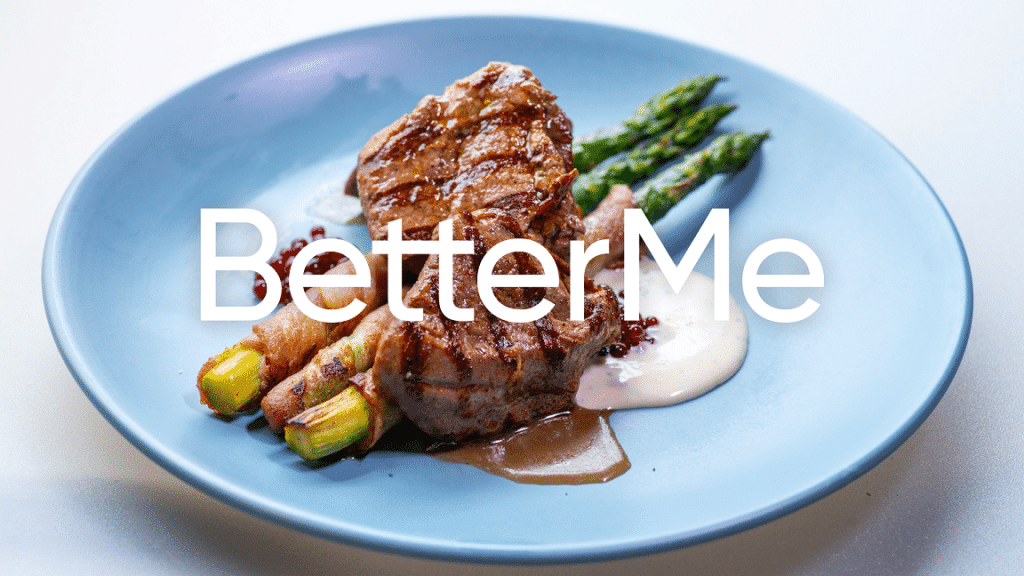
Tips For Building Muscle
There’s plenty that can be said about the right diet for muscle gains. However, your success eventually comes down to doing these two things:
Keep Your Diet Lean
There’s no way around the bodybuilders diet – you have to implement it fully, down to the exact macro ratios and calorie recommendations. These principles will help you keep your diet lean:
Eat At Least 1 Gram Of Protein Per Pound Of Bodyweight
Protein is an extremely crucial component of your diet if you’re looking to gain muscle (8). Many bodybuilders diets recommend an intake of at least 1 gram of protein per pound of your weight. The reason for this is simple – your body needs protein to build muscle.
Keep Carbs Low To Moderate
Carbohydrates are a crucial source of energy for intense training, but in comparison with fats and proteins, carbohydrates have a relatively low amount of protein-building potential – that is, the body must use some of its limited store of amino acids to convert carbs into muscle. However, many people will be able to get away with eating slightly more carbs than the bodybuilders diets recommend. If you’re one of those people, you can simply increase your carb intake slightly. Otherwise, keep carbs low to moderate.
Use A Carb Timing Method If You Can’t Stay On Point With Low-Carb
You can use a carb timing method if you’re one of those people who struggle with getting the right amount of protein and the right ratio of fats and carbs without falling into the trap of feeling extremely hungry or deprived.
A carb timing method (or cyclic ketogenic diet) is a 4-6 week plan based around eating low carbs during the first 2 days of the week, and high carbs on the remaining 3 days. You’ll time your high carb days on high intensity workout days so that the energy gets used up rather than stored.
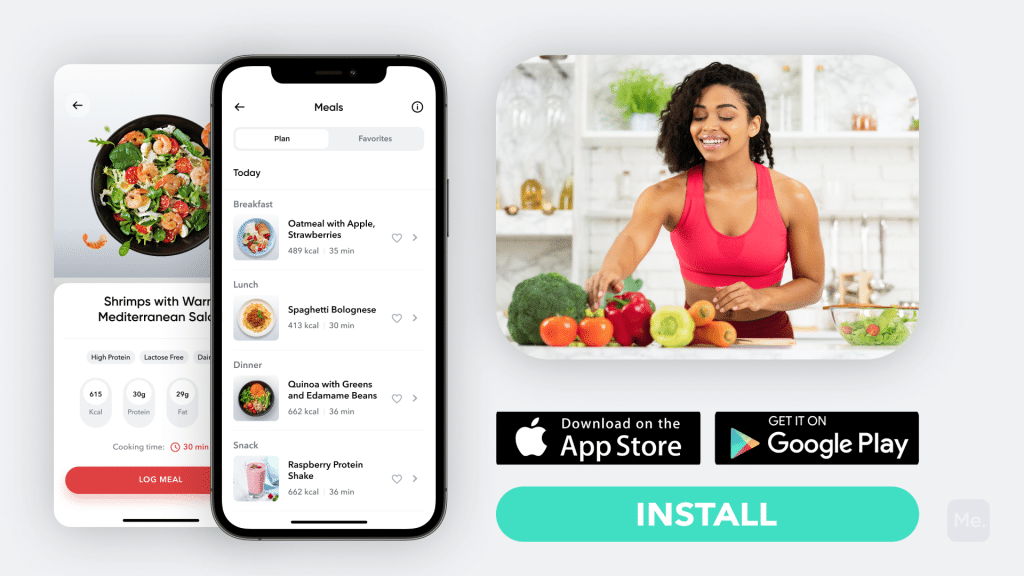
Drink A Gallon Of Water Per Day
Forget low-calorie sweetened drinks and stick with plain, old, water. Drinking a gallon of water per day is essential when you’re looking to build muscle in any way. Eat a lot of fruits and vegetables because they’re a good source of water. Use natural flavors if you don’t like the taste of plain water. You can flavor it with a slice of lemon or your choice of frozen fruits.
Stay On Track
Having a working 7-day meal plan for muscle gain, either male or female is only half the battle. Sticking to it can be challenging. To help you stay on track:
Have A Weekly Cheat Meal
Have a meal that’s higher in carbs and fats once a week, but don’t do it more often than that. This will help you to feel less deprived and more satisfied with the diet as a whole, while still benefiting from the muscle building effects of low-carb.
Take Progress Photos
Feeling unmotivated? Take progress photos to see your results. Take them under similar lighting conditions (preferably natural light). Take photos of yourself from different angles – front, profile, left side, right side. Compare how your body is changing.
Take Protein Drinks And Bars To Curb Cravings
Keep some bars or protein drinks in your bag at all times. When you’re feeling hungry mid-day, grab one of those and enjoy a small snack to curb your cravings. Doing this will keep you from getting too hungry so that when you do eat your next meal, you can eat more protein and less carbs.
The Bottom Line
A 7-day meal plan for muscle gain is great, but it’s equally important to understand the basics of muscle building. Once you do, you’ll keep your diet lean and stay consistent. Your efforts will be rewarded with muscle gains and a sculpted body.

DISCLAIMER:
This article is intended for general informational purposes only and does not address individual circumstances. It is not a substitute for professional advice or help and should not be relied on to make decisions of any kind. Any action you take upon the information presented in this article is strictly at your own risk and responsibility!
SOURCES:















![Toni Kroos là ai? [ sự thật về tiểu sử đầy đủ Toni Kroos ]](https://evbn.org/wp-content/uploads/New-Project-6635-1671934592.jpg)


